
The noted blogger Fjordman is filing this report via Gates of Vienna.
For a complete Fjordman blogography, see The Fjordman Files. There is also a multi-index listing here.

The following essay is an amalgam of my previous online essays, among them Who Are We, Who Are Our Enemies — The Cost of Historical Amnesia, Why We Should Oppose an Independent Kosovo, Refuting God’s Crucible and The Truth About Islam in Europe.
“The Jihad, the Islamic so-called Holy War, has been a fact of life in Europe, Asia, Africa and the Near and Middle East for more than 1300 years, but this is the first history of the Muslim wars in Europe ever to be published. Hundreds of books, however, have appeared on its Christian counterpart, the Crusades, to which the Jihad is often compared, although they lasted less than two hundred years and unlike the Jihad, which is universal, were largely but not completely confined to the Holy Land. Moreover, the Crusades have been over for more than 700 years, while a Jihad is still going on in the world. The Jihad has been the most unrecorded and disregarded major event of history. It has, in fact, been largely ignored. For instance, the Encyclopaedia Britannica gives the Crusades eighty times more space than the Jihad.”
The above quote is from Paul Fregosi’s book Jihad in the West from 1998. Mr. Fregosi found that his book about the history of Islamic Holy War in Europe from the 7th to the 20th centuries was difficult to get published in the mid-1990s, when publishers had the Salman Rushdie case in fresh memory.
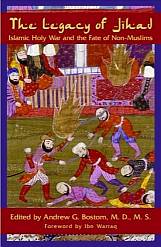 A few years later, perhaps the most comprehensive and scholarly book on the subject to date, The Legacy of Jihad, was published by Andrew G. Bostom. He has written about what he calls “America’s First War on Terror.” Thomas Jefferson and John Adams, then serving as American ambassadors to France and Britain, respectively, met in 1786 in London with the Tripolitan Ambassador to Britain, Sidi Haji Abdul Rahman Adja. These future American presidents were attempting to negotiate a peace treaty which would spare the United States the ravages of Jihad piracy — murder and enslavement emanating from the so-called Barbary States of North Africa, corresponding to modern Morocco, Algeria, Tunisia, and Libya.
A few years later, perhaps the most comprehensive and scholarly book on the subject to date, The Legacy of Jihad, was published by Andrew G. Bostom. He has written about what he calls “America’s First War on Terror.” Thomas Jefferson and John Adams, then serving as American ambassadors to France and Britain, respectively, met in 1786 in London with the Tripolitan Ambassador to Britain, Sidi Haji Abdul Rahman Adja. These future American presidents were attempting to negotiate a peace treaty which would spare the United States the ravages of Jihad piracy — murder and enslavement emanating from the so-called Barbary States of North Africa, corresponding to modern Morocco, Algeria, Tunisia, and Libya.Bostom notes that “an aggressive jihad was already being waged against the United States almost 200 years prior to America becoming a dominant international power in the Middle East.” Israel has nothing to do with it. The Barbary Jihad piracy had been going on since the earliest Arab-Islamic expansion in the 7th and 8th centuries. Francisco Gabrieli states that:
According to present-day concepts of international relations, such activities amounted to piracy, but they correspond perfectly to jihad, an Islamic religious duty. The conquest of Crete, in the east, and a good portion of the corsair warfare along the Provencal and Italian coasts, in the West, are among the most conspicuous instances of such “private initiative” which contributed to Arab domination in the Mediterranean.
A proto-typical Muslim naval razzia occurred in 846 when a fleet of Arab Jihadists arrived at the mouth of the Tiber, made their way to Rome, sacked the city, and carried away from the basilica of St. Peter all of the gold and silver it contained. The creation of the Vatican as a walled “city within a city” was in response to the recurrent threat of Islamic Jihad raids.
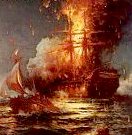 Bostom notes that “By June/July 1815 the ably commanded U.S. naval forces had dealt their Barbary jihadist adversaries a quick series of crushing defeats. This success ignited the imagination of the Old World powers to rise up against the Barbary pirates.”
Bostom notes that “By June/July 1815 the ably commanded U.S. naval forces had dealt their Barbary jihadist adversaries a quick series of crushing defeats. This success ignited the imagination of the Old World powers to rise up against the Barbary pirates.”Yet some Arabs seem to miss the good old days when they could extract jizya payments from the West. Libyan terrorist-sponsoring leader Muammar Gaddafi has stated that he thinks that European nations should pay 10 billion euros ($12.7 billion dollars) a year to Africa to help it stop migrants seeking a better life flooding northwards into Europe. He added without elaborating: “Earth belongs to everybody. Why they (young Africans) emigrated to Europe — this should be answered by Europeans.” Apart from being a clear-cut example of how migration, or rather population dumping, has become a tool for blackmail in the 21st century, this is a throwback to the age when Tripoli could extract payments from Europe.
Robert Davis, professor of history at Ohio State University, developed new methodical enumeration in his book Christian Slaves, Muslim Masters which indicates that perhaps one and one-quarter million white European Christians were enslaved by Barbary Muslims just from 1530 through 1780 — a far greater number than had been estimated before:
- - - - - - - - -
Enslavement was a very real possibility for anyone who traveled in the Mediterranean, or who lived along the shores in places like Italy, France, Spain and Portugal, and even as far north as England and Iceland. Much of what has been written gives the impression that there were not many slaves and minimizes the impact that slavery had on Europe,” Davis said. “Most accounts only look at slavery in one place, or only for a short period of time. But when you take a broader, longer view, the massive scope of this slavery and its powerful impact become clear.
Corsairs from cities in North Africa — Tunis, Algiers etc. — would raid ships in the Mediterranean and Atlantic, as well as seaside villages to capture men, women and children. The impact was devastating — France, England, and Spain each lost thousands of ships, and long stretches of the Spanish and Italian coasts were almost completely abandoned by their inhabitants.
At its peak, the destruction and depopulation of some areas probably exceeded what European slavers would later inflict on the African interior. The lives of European slaves were often no better than the victims of the transatlantic slave trade, which tapped into the pre-established Islamic slave-trade in Africa. “As far as daily living conditions, the Mediterranean slaves certainly didn’t have it better,” Davis says. While African slaves did grueling labor on sugar and cotton plantations in the Americas, European slaves were often worked just as hard and as lethally — in quarries, in heavy construction, and above all rowing the corsair galleys.
Throughout most of the seventeenth century, the English alone lost at least 400 sailors a year to the slavers. One American slave reported that 130 American seamen had been enslaved by the Algerians in the Mediterranean and Atlantic just between 1785 and 1793 (which prompted the later military response from the Americans). In his book White Gold, Giles Milton describes how regular Jihad razzias in Europe extended as far north as Iceland. Even during the time of Queen Elizabeth I, while William Shakespeare was writing his plays and poems, young Englishmen risked being surprised by a fleet of Muslim pirates showing up at their village, or being kidnapped while fishing at sea:
By the end of the dreadful summer of 1625, the mayor of Plymouth reckoned that 1,000 skiffs had been destroyed, and a similar number of villagers carried off into slavery.” Such events took place across much of Europe, also in Wales and southern Ireland: “In 1631…200 Islamic soldiers…sailed to the village of Baltimore, storming ashore with swords drawn and catching the villagers totally by surprise. (They) carried off 237 men, women, and children and took them to Algiers…The French padre Pierre Dan was in the city (Algiers) at the time…He witnessed the sale of the captives in the slave auction. ‘It was a pitiful sight to see them exposed in the market…Women were separated from their husbands and the children from their fathers…on one side a husband was sold; on the other his wife; and her daughter was torn from her arms without the hope that they’d ever see each other again’.
The Englishman Thomas Pellow was enslaved in Morocco for twenty-three years after being captured by Barbary pirates as a cabin boy on a small English vessel in 1716. He was tortured until he accepted Islam. For weeks he was beaten and starved, and finally gave in after his torturer resorted to “burning my flesh off my bones by fire, which the tyrant did, by frequent repetitions, after a most cruel manner.”
God’s Crucible: Islam and the Making of Europe, 570-1215 was written by David Levering Lewis, the American historian and two-time winner of the prestigious Pulitzer Prize. He states that Muslims did not enslave their co-religionists, only infidels. Yes, but why is that better?
As Robert Spencer writes in his book Religion of Peace?: “The Qur’an says that the followers of Muhammad are ‘ruthless to the unbelievers but merciful to one another’ (48:29), and that the unbelievers are the ‘worst of created beings’ (98:6). One may exercise the Golden Rule in relation to a fellow Muslim, but according to the laws of Islam, the same courtesy is not to be extended to unbelievers. That is one principal reason why the primary source of slaves in the Islamic world has been non-Muslims, whether Jews, Christians, Hindus, or pagans. Most slaves were non-Muslims who had been captured during jihad warfare.”
Slavery was taken for granted throughout Islamic history. When it was finally abolished this was due to Western pressure, especially the efforts of the British Empire. Spencer again: “Nor was there a Muslim abolitionist movement, no Clarkson, Wilberforce, or Garrison. When the slave trade ended, it was ended not through Muslim efforts but through British military force. Even so, there is evidence that slavery continues beneath the surface in some Muslim countries — notably Saudi Arabia, which only abolished slavery in 1962; Yemen and Oman, both of which ended legal slavery in 1970; and Niger, which didn’t abolish slavery until 2004. In Niger, the ban is widely ignored, and as many as one million people remain in bondage. Slaves are bred, often raped, and generally treated like animals. There are even slavery cases involving Muslims in the United States. A Saudi named Homaidan al-Turki was sentenced in September 2006 to twenty-seven years to life in prison for keeping a woman as a slave in his Colorado home. For his part, al-Turki claimed that he was a victim of anti-Muslim bias.”
Jihad slavery was widespread in Africa and in many regions of Asia. Indian historian K. S. Lal states that wherever Jihadists conquered a territory, “there developed a system of slavery peculiar to the clime, terrain, and populace of the place.” When Muslim armies invaded India, “its people began to be enslaved in droves to be sold in foreign lands or employed in various capacities on menial and not-so-menial jobs within the country.”
Briefly summed up, God’s Crucible laments the fact that Charles Martel, “the Hammer,” halted the advancing Islamic Jihad at the Battle of Tours or, Battle of Poitiers, in 732:
Had ‘Abd al-Rahman’s men prevailed that October day, the post-Roman Occident would probably have been incorporated into a cosmopolitan, Muslim regnum unobstructed by borders, as they hypothesize — one devoid of a priestly caste, animated by the dogma of equality of the faithful, and respectful of all religious faiths. Curiously, such speculation has a French pedigree. Forty years ago, two historians, Jean-Henri Roy and Jean Deviosse enumerated the benefits of a Muslim triumph at Poitiers: astronomy; trigonometry; Arabic numerals; the corpus of Greek philosophy. ‘We [Europe] would have gained 267 years,’ according to their calculations. ‘We might have been spared the wars of religion.’ To press the logic of this disconcerting analysis, the victory of Charles the Hammer must be seen as greatly contributing to the creation of an economically retarded, balkanized, fratricidal Europe that, in defining itself in opposition to Islam, made virtues out of religious persecution, cultural particularism, and hereditary aristocracy.
David Levering Lewis is clearly sympathetic towards this view, and writes that the Carolingian order, established Charles Martel (Carolus in Latin) and his grandson Charlemagne, was “religiously intolerant, intellectually impoverished, socially calcified, and economically primitive.” Curiously, he mentions in passing that there was continuous “out-migration to the Christian kingdoms” from al-Andalus. Why did they move to the Christian lands, whose economy was “little better than late Neolithic,” if life was so sweet in al-Andalus? Lewis states that: “At the end of the eighth century, Europe was militarily strong enough to defend itself from Islam, thanks in part to Charlemagne and his predecessors. The question was whether it was politically, economically, and culturally better off for being able to do so.”
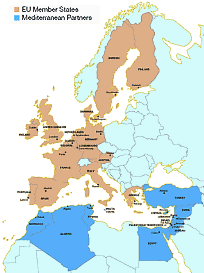 God’s Crucible was published during a time when Spain and Portugal under Islamic occupation are being hailed as a model of coexistence with Islam. The European Union recently announced its intentions of expanding to include the Muslim Middle East and North Africa. There is a concerted effort going on to present Islam as something non-threatening, indeed benevolent. In May 2008, Germany’s Der Spiegel, Europe’s largest weekly magazine, hailed al-Andalus as a “Multicultural model“ for Europe: “For nearly 800 years, the inhabitants of al-Andalus, as the Arab dynasties called their empire on the Iberian Peninsula, allowed Jews, Christians and Muslims to coexist in a spirit of mutual respect — a situation that benefited all.” Never mind that Richard Fletcher states in his book Moorish Spain that “Moorish Spain was not a tolerant and enlightened society even in its most cultivated epoch.”
God’s Crucible was published during a time when Spain and Portugal under Islamic occupation are being hailed as a model of coexistence with Islam. The European Union recently announced its intentions of expanding to include the Muslim Middle East and North Africa. There is a concerted effort going on to present Islam as something non-threatening, indeed benevolent. In May 2008, Germany’s Der Spiegel, Europe’s largest weekly magazine, hailed al-Andalus as a “Multicultural model“ for Europe: “For nearly 800 years, the inhabitants of al-Andalus, as the Arab dynasties called their empire on the Iberian Peninsula, allowed Jews, Christians and Muslims to coexist in a spirit of mutual respect — a situation that benefited all.” Never mind that Richard Fletcher states in his book Moorish Spain that “Moorish Spain was not a tolerant and enlightened society even in its most cultivated epoch.”The European Union, the Council of Europe and numerous Islamic organizations are working hard to rewrite European school textbooks in order to promote Islam. In the European Parliament, the German Christian Democrat Hans-Gert Pöttering has stated that textbooks should be reviewed for intolerant depictions of Islam to ensure that they don’t propagate “prejudice.” He suggested that the EU should co-operate with the Organization of the Islamic Conference to create a textbook review committee. The OIC desires to rewrite textbooks around the world to remove anything critical of Islam, silence mentioning of the victims of 1400 years of Islamic Jihad and glorify the achievements of “Islamic civilization.”
Robert Spencer writes in Religion of Peace?: Why Christianity Is and Islam Isn’t: “Islamic apologist Karen Armstrong enunciates the common wisdom when she says that ‘until 1492, Jews and Christians lived peaceably and productively together in Muslim Spain — a coexistence that was impossible elsewhere in Europe.’ Even the U.S. State Department has proclaimed that ‘during the Islamic period in Spain, Jews, Christians, and Muslims lived together in peace and mutual respect, creating a diverse society in which vibrant exchanges of ideas took place.’“
Those who want a second opinion can start with reading the online essay Andalusian Myth, Eurabian Reality by Bat Ye’or and Andrew G. Bostom: “There were rarely periods of peace in the Amirate of Cordova (756-912), nor later. Al-Andalus represented the land of jihad par excellence. Every year, sometimes twice a year, raiding expeditions were sent to ravage the Christian Spanish kingdoms to the north, the Basque regions, or France and the Rhone valley, bringing back booty and slaves. Andalusian corsairs attacked and invaded along the Sicilian and Italian coasts, even as far as the Aegean Islands, looting and burning as they went. Thousands of people were deported to slavery in Andalusia, where the caliph kept a militia of tens of thousand of Christian slaves brought from all parts of Christian Europe (the Saqaliba), and a harem filled with captured Christian women.”
David Levering Lewis mentions “a small group of Andalusian Christians” filled with “fanaticism” who engaged in “a senseless spike in religious provocation” where individual Christian priests and laypersons “publicly disrespected mosques, the Qur’an, and the Prophet’s name.” Because of this, Cordoba’s qadi (Islamic judge), poor thing, had no choice. The ruler Muhammad I “approved his qadi‘s death sentence in 851-52 for thirteen Christians for whom clemency was impolitic if not impossible under Malikite Sharia.”
Unfortunately, these “Christian militants,” as Mr. Lewis calls them, were still deaf to all pleas of behaving in a properly submissive manner to Muslims, and more death sentences ensued:
Twenty or so ‘Mozarab martyrs’ were dispatched in 853 or the year following, and a dozen more afterward. In another wave of Christian blasphemy in 859, thirteen more were executed, along with two daughters of a prominent Muslim family living in distant Huesca who defiantly disclosed their secret Christian conversion.
Lewis believes that: “A poll taken of Andalusians of all faiths would have shown an overwhelming disapproval of the ‘Mozarab martyrs.’ These Christian extremists were an aberration not because they acted outside history but because they were premature — three centuries ahead of the history whose intense cultural nationalism and religious intolerance were inculcated in the decades after the Battle of Clavijo.”
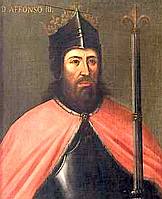 The “religious intolerance” he is referring to is not the Jihad waged against Christians and Jews in Spain and Portugal; it is the Reconquista, the Christian reconquest of the Iberian Peninsula. It is traditionally seen to have begun with Pelayo in 718. Although initially slow, it speeded up from the eleventh century onwards. The Portuguese had been liberated in 1249 under King Afonso III. The concept “Holy War” was originally alien to Christianity and was imported to Europe only after Europeans had been confronted with centuries of Islamic Jihad.
The “religious intolerance” he is referring to is not the Jihad waged against Christians and Jews in Spain and Portugal; it is the Reconquista, the Christian reconquest of the Iberian Peninsula. It is traditionally seen to have begun with Pelayo in 718. Although initially slow, it speeded up from the eleventh century onwards. The Portuguese had been liberated in 1249 under King Afonso III. The concept “Holy War” was originally alien to Christianity and was imported to Europe only after Europeans had been confronted with centuries of Islamic Jihad.Lewis himself states (correctly) that people during this “golden age of tolerance” were executed for criticizing Islam. Isn’t that disturbing, given that al-Andalus is now supposed to serve as the blueprint for our coexistence with Islam, according to our authorities and media? “Blasphemy” against Islam and Muhammad is punishable by death in sharia law, which is why the Dutch filmmaker Theo van Gogh was murdered by a Muslim in Amsterdam in 2004.
Even for those non-Muslims who accept Islamic rule life is harsh, with severe economic strains and the constant threat of violence in the back of your mind. Scholar Bat Ye’or is an expert on dhimmitude, the oppressive system for non-Muslims under Islamic rule, described in the book Islam and Dhimmitude. She writes this about the Jihad slave system:
When Amr conquered Tripoli (Libya) in 643, he forced the Jewish and Christian Berbers to give their wives and children as slaves to the Arab army as part of their jizya. From 652 until its conquest in 1276, Nubia was forced to send an annual contingent of slaves to Cairo. Treaties concluded with the towns of Transoxiana [Iranian central Asia], Sijistan [eastern Iran], Armenia, and Fezzan (Maghreb) under the Umayyads and Abbasids stipulated an annual dispatch of slaves from both sexes. However, the main sources for the supply of slaves remained the regular raids on villages within the dar-al-harb [non-Islamic regions] and the military expeditions which swept more deeply into the infidel lands, emptying towns and provinces of their inhabitants.
According to Robert Spencer, “Although the strictness with which the laws of dhimmitude (the subservient status of Jews and Christians) were enforced varied, they were never abolished, and during times of relaxation the subject populations always lived in fear that they would be enforced with new stringency. Muslim rulers did not forget that the Qur’an mandates that both Jews and Christians must ‘feel themselves subdued.’ One notable instance is recounted by Arab historian Philip Hitti: ‘The caliph al-Mutawakkil in 850 and 854 decreed that Christians and Jews should affix wooden images of devils to their houses, level their graves even with the ground, wear outer garments of honey color, i.e., yellow, put two honey-colored patches on the clothes of their slaves… and ride only on mules and asses with wooden saddles marked by two pomegranate-like balls on the cantle.’“
In 1888, a Tunisian Jew noted: “The Jew is prohibited in this country to wear the same clothes as a Muslim and may not wear a red tarbush. He can be seen to bow down with his whole body to a Muslim child and permit him the traditional privilege of striking him in the face, a gesture that can prove to be of the gravest consequence. Indeed, the present writer has received such blows. In such matters the offenders act with complete impunity, for this has been the custom from time immemorial.”
Maimonides, the renowned medieval Jewish philosopher and physician who had to flee Islamic-ruled Spain due to an aggressive Jihad, stated that “the Arabs have persecuted us severely, and passed baneful and discriminatory legislation against us… Never did a nation molest, degrade, debase, and hate us as much as they.” Jews could teach rabbinic law to Christians, but Muslims will interpret what they are taught “according to their erroneous principles and they will oppress us. [F]or this reason… they hate all [non-Muslims] who live among them.” Christians “admit that the text of the Torah, such as we have it, is intact.”
What about science and learning? Scholar Toby E. Huff, author of the book The Rise of Early Modern Science: Islam, China and the West, warns that if Islam had taken over Europe, later Western scientific achievements would have been impossible:
If Spain had persisted as an Islamic land into the later centuries — say, until the time of Napoleon — it would have retained all the ideological, legal, and institutional defects of Islamic civilization. A Spain dominated by Islamic law would have been unable to found new universities based on the European model of legally autonomous corporate governance, as corporations do not exist in Islamic law. Furthermore, the Islamic model of education rested on the absolute primacy of fiqh, of legal studies, and the standard of preserving the great traditions of the past. This was symbolically reflected in the ijaza, the personal authorization to transmit knowledge from the past given by a learned man, a tradition quite different from the West’s group-administered certification (through examination) of demonstrated learning. In the actual event, the founding of Spanish universities in the thirteenth century, first in Palencia (1208-9), Valladolid, Salamanca (1227-8), and so on, occurred in long-established Christian areas, and the universities were modeled after the constitutions of Paris and Bologna.
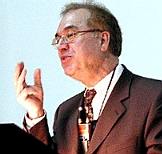 Greek learning was never integrated into the regular curriculum at Islamic schools, as it was in European universities. The German-Syrian writer Bassam Tibi points out that “science” in the Islamic madrasa meant the study of the Koran, the hadith, Arab history etc.: “Some Islamic historians wrongly translate the term madrasa as university. This is plainly incorrect: If we understand a university as universitas litterarum, or consider, without the bias of Eurocentrism, the case of the universitas magistrorum of the thirteenth century in Paris, we are bound to recognise that the university as a seat for free and unrestrained enquiry based on reason, is a European innovation in the history of mankind.”
Greek learning was never integrated into the regular curriculum at Islamic schools, as it was in European universities. The German-Syrian writer Bassam Tibi points out that “science” in the Islamic madrasa meant the study of the Koran, the hadith, Arab history etc.: “Some Islamic historians wrongly translate the term madrasa as university. This is plainly incorrect: If we understand a university as universitas litterarum, or consider, without the bias of Eurocentrism, the case of the universitas magistrorum of the thirteenth century in Paris, we are bound to recognise that the university as a seat for free and unrestrained enquiry based on reason, is a European innovation in the history of mankind.”According to the leading scholar Edward Grant in Science and Religion, 400 B.C. to A.D. 1550: From Aristotle to Copernicus, Islam is a theocracy in which religion and state form a single entity. There is thus no secular state apparatus distinct from the Islamic religion:
[Islamic madrasas] had as their primary mission the teaching of the Islamic religion, and paid little attention to the foreign sciences, which, as we saw, were comprised of the science and natural philosophy derived ultimately from the Greeks. The analytical subjects derived from the Greeks certainly did not have equal status with religious and theological subjects. Indeed, the foreign sciences played a rather marginal role in the madrasas, which formed the core of Islamic higher education. Only those subjects that illuminated the Qur’an or the religious law were taught. One such subject was logic, which was found useful not only in semantics but was also regarded as helpful in avoiding simple errors of inference. The primary function of the madrasas, however, was ‘to preserve learning and defend orthodoxy’ (Mottahedeh 1985, 91). In Islam, most theologians did not regard natural philosophy as a subject helpful to a better understanding of religion. On the contrary, it was usually viewed as a subject capable of subverting the Islamic religion and, therefore, as potentially dangerous to the faith. Natural philosophy always remained a peripheral discipline in the lands of Islam and was never institutionalized within the educational system, as it was in Latin Christendom.
Fear and uncertainty afflicted all too many Islamic natural philosophers. As Grant states, “Without the separation of church and state, and the developments that proceeded as a consequence, the West would not have produced a deeply rooted natural philosophy that was disseminated through Europe by virtue of an extensive network of universities, which laid the foundation for the great scientific advances made in the sixteenth and seventeenth centuries, advances that have continued to the present day.”
The Age of Exploration during the fifteenth and sixteenth centuries was undertaken in order to get away from Muslims and re-establish contact with the civilizations of Asia without hostile Muslim middlemen. Norman Davies puts it this way in his monumental Europe: A History:
Islam’s conquests turned Europe into Christianity’s main base. At the same time the great swathe of Muslim territory cut the Christians off from virtually all direct contact with other religions and civilizations. The barrier of militant Islam turned the [European] Peninsula in on itself, severing or transforming many of the earlier lines of commercial, intellectual and political intercourse.
Jihad piracy, slavery and attacks on European countries were a constant menace from the Jihad in the seventh century until the so-called Barbary States in North Africa in the nineteenth century. Some would argue that it is resurfacing again now, for instance in the form of kidnapping of Western tourists which is becoming increasingly common as I write these words, encouraged by the ransom money often paid by European authorities.
Jihad continues to this day in the Balkans, a region which was for centuries under brutal Turkish rule. According to writer Ruth King, “When Serbia became independent of Byzantine rule in the 12th century, its economic, cultural, social and religious institutions were among the most advanced in Europe. Serbia functioned as a bridge between Greco-Byzantine civilization and the developing Western Renaissance. The center of the Serbian Orthodox Church was in Kosovo where churches, monasteries and monastic communities were established. A form of census in 1330, the ‘Decani Charter,’ detailed the list of chartered villages and households, of which only two percent were Albanian. The Ottomans invaded Serbia in 1389 and consolidated their rule in 1459, propelling major parts of the Balkan peninsula and adjacent southeast Europe into a Koran-dictated Dark Ages.”
Early in the twentieth century Serbian Christians comprised roughly two-thirds of the population of Kosovo. After WW2, Communist dictator Tito did not allow Serbs who fled from their homes to return and did not enforce border controls as thousands of Albanians moved into Kosovo. This later led to escalating violence against Christian Serbs.
As King says, “Initially, the media reported the situation in Kosovo fairly. For example, in July 1982 The New York Times noted: ‘Serbs have been harassed by Albanians and have packed up and left the region. The Albanian nationalists have a two-point platform, first to establish what they call an ethnically clean Albanian republic and then to merge with Albania for a greater Albania. Some 57,000 Serbs have left Kosovo in the last decade.’ Five years later, in 1987, the Times was still reporting the persecution of Serbs within Kosovo. ‘Slavic Orthodox churches have been attacked, wells poisoned, crops burned, Slavic boys knifed. Young Albanians have been told to rape Serbian girls… Officials in Belgrade view the ethnic Albanian challenge as imperiling the foundations of the multinational experiment called federal Yugoslavia… Ethnic Albanians already control almost every phase of life in the autonomous province of Kosovo, including the police, judiciary, civil service, schools, and factories.’“
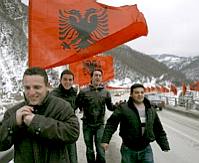 It was this situation that led to the rise of Serb nationalist leader Slobodan Milosevic. However, according to Ruth King, “While the brutality of the Milosevic regime was indeed a complicating factor, he is long gone, but the KLA [Kosovo Liberation Army] continues its assault on Serbs, on their churches, priests, homes, even on civilians sitting in cafes, this under the nose of the U.S. and UN troops.”
It was this situation that led to the rise of Serb nationalist leader Slobodan Milosevic. However, according to Ruth King, “While the brutality of the Milosevic regime was indeed a complicating factor, he is long gone, but the KLA [Kosovo Liberation Army] continues its assault on Serbs, on their churches, priests, homes, even on civilians sitting in cafes, this under the nose of the U.S. and UN troops.”Bosnia’s wartime president Alija Izetbegovic died in 2003, hailed as a moderate Muslim leader. Little was said in Western media about his 1970 Islamic Declaration, where he advocated “a struggle for creating a great Islamic federation from Morocco to Indonesia, from the tropical Africa to the Central Asia,” and that “The Islamic movement should and must start taking over the power as soon as it is morally and numerically strong enough to not only overthrow the existing non-Islamic, but also to build up a new Islamic authority.”
According to Hugh Fitzgerald, “One must keep in mind both the way in which some atrocities ascribed to Serbs were exaggerated, while the atrocities inflicted on them were minimized or ignored altogether. But what was most disturbing was that there was no context to anything: nothing about the centuries of Muslim rule. Had such a history been discussed early on, Western governments might have understood and attempted to assuage the deep fears evoked by the Bosnian Muslim leader, Izetbegovic, when he wrote that he intended to create a Muslim state in Bosnia and impose the Sharia not merely there, but everywhere that Muslims had once ruled in the Balkans. Had the Western world shown the slightest intelligent sympathy or understanding of what that set off in the imagination of many Serbs (and elsewhere, among the Christians in the Balkans and in Greece), there might never have been such a violent Serbian reaction, and someone like Milosevic might never have obtained power.”
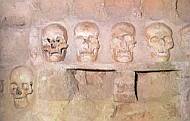 In 1809, after the battle on Cegar Hill, by order of Turkish pasha Hurshid the skulls of the killed Serbian soldiers were built in a tower, Skull Tower, on the way to Constantinople. 3 meters high, Skull Tower was built out of 952 skulls as a warning to the Serbian people not to oppose their Muslim rulers. Some years later, a chapel was built over the skulls.
In 1809, after the battle on Cegar Hill, by order of Turkish pasha Hurshid the skulls of the killed Serbian soldiers were built in a tower, Skull Tower, on the way to Constantinople. 3 meters high, Skull Tower was built out of 952 skulls as a warning to the Serbian people not to oppose their Muslim rulers. Some years later, a chapel was built over the skulls.Similar Jihad massacres were committed not only against the Serbs, but against the Greeks, the Bulgarians and other non-Muslims who slowly rebelled against the Ottoman Empire throughout the 19th century. Professor Vahakn Dadrian and others have clearly identified Jihad as a critical factor in the Armenian genocide in the early 20th century.
As Efraim Karsh notes, “The Ottomans embarked on an orgy of bloodletting in response to the nationalist aspirations of their European subjects. The Greek war of independence of the 1820’s, the Danubian uprisings of 1848 and the attendant Crimean war, the Balkan explosion of the 1870’s, the Greco-Ottoman war of 1897—all were painful reminders of the costs of resisting Islamic imperial rule.”
In his book Onward Muslim Soldiers, Robert Spencer quotes a letter from Bosnia, written in 1860 by the acting British Consul in Sarajevo, James Zohrab :
The hatred of the Christians toward the Bosniak Mussulmans is intense. During a period of nearly 300 years they were subjected to much oppression and cruelty. For them no other law but the caprice of their masters existed… Oppression cannot now be carried on as openly as formerly, but it must not be supposed that, because the Government employés do not generally appear as the oppressors, the Christians are well treated and protected.
The Islamic world is now using the Balkans as a launching pad for Jihad against the rest of Europe. “There are religious centres in Bulgaria that belong to Islamic groups financed mostly by Saudi Arabian groups,” the head of Bulgarian military intelligence has warned. According to him, the centres were in southern and southeastern Bulgaria, where the country’s Muslims, mainly of Turkish origin, are concentrated, and “had links with similar organisations in Kosovo, Bosnia and Macedonia. For them Bulgaria seems to be a transit point to Western Europe.” He said the steps were taken to prevent terrorist groups gaining a foothold in Bulgaria, which shares a border with Turkey. Bulgaria’s Muslim minority accounts for more than 10 percent of the country’s population.
The Former Yugoslav Republic of Macedonia passed a law allowing ethnic Albanians to display the Albanian national flag in areas where they form the majority. The decision came as a result of seven months of heavy fighting in 2001 involving Albanian separatists, and following pressure from the European Union, always ready to please Muslims.
Ethnic Albanians make up about 25 per cent of Macedonia’s population. If the demographic trends are anything like in Kosovo, where the predominantly Muslim Albanians have been out-breeding their non-Muslim neighbors, Macedonians could be facing serious trouble in the future. In Kosovo, dozens of churches and monasteries have been destroyed or damaged following ethnic cleansing of Christian Serbs, all under the auspices of NATO soldiers.
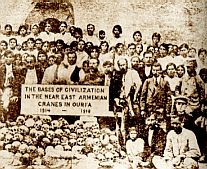 Martti Ahtisaari, former President of Finland and later Chief United Nations negotiator for Kosovo, caused anger in Serbia when he stated that “Serbs are guilty as a people,” implying that they would have to pay for it, possibly by losing the province of Kosovo. I disagree with Mr. Ahtisaari. It is one thing to criticize the brutality of the Milosevic regime. It is quite another thing to claim that “Serbs are guilty as a people.” If anybody in the Balkans can be called guilty as a people, it is the Turks, not the Serbs. The Turks have left a trail of blood across much of Europe and the Mediterranean for centuries, culminating in the Armenian genocide in the 20th century, which Turkey still refuses to acknowledge, let alone apologize for.
Martti Ahtisaari, former President of Finland and later Chief United Nations negotiator for Kosovo, caused anger in Serbia when he stated that “Serbs are guilty as a people,” implying that they would have to pay for it, possibly by losing the province of Kosovo. I disagree with Mr. Ahtisaari. It is one thing to criticize the brutality of the Milosevic regime. It is quite another thing to claim that “Serbs are guilty as a people.” If anybody in the Balkans can be called guilty as a people, it is the Turks, not the Serbs. The Turks have left a trail of blood across much of Europe and the Mediterranean for centuries, culminating in the Armenian genocide in the 20th century, which Turkey still refuses to acknowledge, let alone apologize for.Dimitar Angelov elucidates the impact of the Ottoman Jihad on the vanquished Balkan populations:
…the conquest of the Balkan Peninsula accomplished by the Turks over the course of about two centuries caused the incalculable ruin of material goods, countless massacres, the enslavement and exile of a great part of the population — in a word, a general and protracted decline of productivity, as was the case with Asia Minor after it was occupied by the same invaders. This decline in productivity is all the more striking when one recalls that in the mid-fourteenth century, as the Ottomans were gaining a foothold on the peninsula, the States that existed there — Byzantium, Bulgaria and Serbia — had already reached a rather high level of economic and cultural development….The campaigns of Mourad II (1421-1451) and especially those of his successor, Mahomet II (1451-1481) in Serbia, Bosnia, Albania and in the Byzantine princedom of the Peloponnesus, were of a particularly devastating character.
This Ottoman Jihad tradition is still continued by “secular” Turkey to this day. Michael J. Totten visited Varosha, the Ghost City of Cyprus, in 2005. The city was deserted during the Turkish invasion of Cyprus in 1974 and is now fenced off and patrolled by the Turkish occupiers. The Turks carved up the island. Greek Cypriot citizens in Varosha expected to return to their homes within days. Instead, the Turks seized the empty city and wrapped it in fencing and wire.
In March 2006, Italian Luigi Geninazzi made a report from the same area. 180,000 persons live in the northern part of the island, 100,000 of whom are colonists originally from mainland Turkey. According to Geninazzi, the Islamization of the north of Cyprus has been concretized in the destruction of all that was Christian. Yannis Eliades, director of the Byzantine Museum of Nicosia, calculates that 25,000 icons have disappeared from the churches in the zone occupied by the Turks. Stupendous Byzantine and Romanesque churches, imposing monasteries, mosaics and frescoes have been sacked, violated, and destroyed. Many have been turned into restaurants, bars, and nightclubs. Geninazzi confronted Huseyn Ozel, a government spokesman for the self-proclaimed Turkish Republic of Northern Cyprus, with this. Most of the mosques in Greek Cypriot territory have been restored. So why are churches still today being turned into mosques? The Turkish Cypriot functionary spreads his arms wide: “It is an Ottoman custom…”
Yosef Bodansky, director of the Congressional Task Force on Terrorism and Conventional Warfare in Washington in the USA, has stated that the Balkans was a “springboard for Islamic extremism” in Europe, with the Islamic Republic of Iran as the main driving force behind it. Iran and Saudi Arabia supplied funding, weapons and men to the Bosnians during the war in the 1990s, and terrorist organization Al-Qaeda gained a foothold in the Balkans. Saudi Arabia has invested more than $1 billion in the Sarajevo region alone, for projects that include the construction of 158 mosques. Sarajevo has by now become an almost entirely Muslim city.
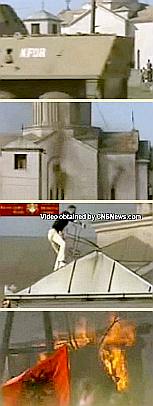 Miroljub Jevtic, professor at the Belgrade University and author of a number of books on the topic of Islam and politics, believes the Western world is in favor of detaching Kosovo from Christian Serbia by fiat and making it into an independent (Muslim) state. The main argument of those supporting this scenario, notably in the United States, is to improve their image in the eyes of the Islamic world and “co-opt the influence of Islamic ‘extremists.’“
Miroljub Jevtic, professor at the Belgrade University and author of a number of books on the topic of Islam and politics, believes the Western world is in favor of detaching Kosovo from Christian Serbia by fiat and making it into an independent (Muslim) state. The main argument of those supporting this scenario, notably in the United States, is to improve their image in the eyes of the Islamic world and “co-opt the influence of Islamic ‘extremists.’“Jevtic notes that “the fact that since the arrival of NATO to Kosovo over 150 Christian churches have been destroyed and some 400 mosques have been built, or are under construction, is for the Muslims a proof that if there is a faith which is supported by true God — it is Islam! Because, why would the Christian God, why would Jesus, permit the destruction of churches, where He, Jesus, is glorified? Why would He, at the same time, permit the construction of mosques, where His existence as God is denied? Why would He permit it, moreover, in the presence of men who bear arms and who claim to be Christians?”
Miroljub Jevtic warns that the European Union’s support for Albanian Muslim demands could backfire badly: “Granting the independence to Kosovo will be taken as proof of Europe’s own wish to cease to exist, as it not only allows the expansion of Islam but is actively promoting it by aiding those who are destroying churches, raping nuns, spitting on crosses and daubing with excrement holy images of Christ.”
In Kosovo, dozens of churches and monasteries have been destroyed following ethnic cleansing of Christian Serbs by the predominantly Muslim Albanians, all under the auspices of NATO soldiers, and Muslims are not ungrateful. Kosovo Albanians plan to honor their “savior,” former US President Bill Clinton, by erecting a statue of him. Yet in 2007, four Albanians from Kosovo along with other Muslims were arrested for conspiring to attack Fort Dix, a military base in New Jersey, the USA, in order “to kill as many soldiers as possible.”
Western governments are pushing for independence for a group of Jihadist thugs who recently wanted to create the Osama bin Laden mosque in Kosovo. This name was eventually changed for public relations reasons since the Albanians knew they needed American political support. In June 2007 the visiting US President George W. Bush was hailed as a hero by a group of Albanians, who allegedly also stole his watch. “Sooner rather than later you’ve got to say ‘Enough’s enough — Kosovo is independent,’“ Bush told cheering Albanians. As German newspaper Süddeutsche Zeitung later commented, “Why should the Albanians settle for autonomy when George W. Bush had already promised them their own state?”
President Bush declared a “war on terror” after the Jihadist attacks on the United States in 2001. Six years later, all he has achieved is bleeding American tax payers financially and American soldiers literally while overseeing the eradication of non-Muslim communities in Iraq. Now his administration supports independence for terrorist-sponsoring Muslims in the Balkans and in the Palestinian territories. George W. Bush risks being remembered as one of the worst presidents in American history.
In a commentary, “We bombed the wrong side?” former Canadian UNPROFOR Commander Lewis MacKenzie wrote, “The Kosovo-Albanians have played us like a Stradivarius. We have subsidized and indirectly supported their violent campaign for an ethnically pure and independent Kosovo. We have never blamed them for being the perpetrators of the violence in the early ‘90s and we continue to portray them as the designated victim today in spite of evidence to the contrary. When they achieve independence with the help of our tax dollars combined with those of bin Laden and al-Qaeda, just consider the message of encouragement this sends to other terrorist-supported independence movements around the world.”
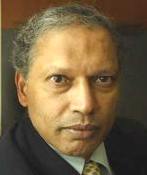 I once listened to a speech by Patrick Sookhdeo, a brave former Muslim who has published books such as Global Jihad: The Future in the Face of Militant Islam. Sookhdeo had done a lot of excellent — and frightening — research regarding the Islamization of Western Europe, especially Britain. He recalled having a conversation with a senior Western official regarding what would happen if Muslims in a region of, say, Britain or the Netherlands, should declare that they would no longer accept the laws of the central government and formed a breakaway Islamic Republic. This official then replied that they would probably have to quietly accept that. When witnessing Muslim riots in France and elsewhere, which more and more resemble a civil war, this question is no longer just hypothetical.
I once listened to a speech by Patrick Sookhdeo, a brave former Muslim who has published books such as Global Jihad: The Future in the Face of Militant Islam. Sookhdeo had done a lot of excellent — and frightening — research regarding the Islamization of Western Europe, especially Britain. He recalled having a conversation with a senior Western official regarding what would happen if Muslims in a region of, say, Britain or the Netherlands, should declare that they would no longer accept the laws of the central government and formed a breakaway Islamic Republic. This official then replied that they would probably have to quietly accept that. When witnessing Muslim riots in France and elsewhere, which more and more resemble a civil war, this question is no longer just hypothetical.As writer Julia Gorin has warned, “An independent Kosovo will serve as a nod to secessionists worldwide,” and “history will show what no one cares to understand: the current world war began officially in Yugoslavia” in the 1990s.
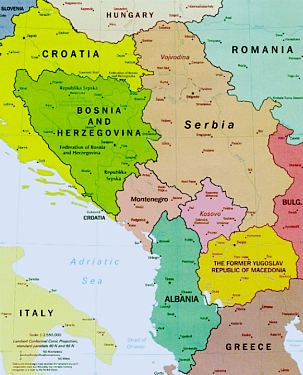
Granting Jihadist Muslims independence in Kosovo after they conducted ethnic cleansing of non-Muslims has established an extremely dangerous precedent. Not only is it immoral to sacrifice the freedom or perhaps existence of smaller nations, be that the Serbs or the Israelis, in order to save your own skin. As the example of Czechoslovakia demonstrated prior to WW2, it is also counterproductive. Supporting independence for Muslim Albanians in Kosovo will not lead to stabilization of the Balkans; it will rather lead to the Balkanization of the West. The new thug state will serve as a launching pad for Jihad activities against non-Muslims, just like an independent Palestinian state would do in the Middle East. In the case of Kosovo, the Russians are right and Western leaders, both in the European Union and the United States, are wrong. The Serbs have suffered enough, and don’t need to be stabbed in the back by the West as well.
Janos (John) Hunyadi, Hungarian warrior and captain-general, is today virtually unknown outside Hungary and the Balkans, but he probably did more than any other individual in stemming the Turkish invasion in the fifteenth century. His actions spanned all the countries of south-eastern Europe, leading international armies, negotiating with kings and popes. He died of plague after having destroyed an Ottoman fleet outside Belgrade in1456. His work slowed the Muslim advance, and may thus have saved Western Europe from falling to Islam. By extension, he may have helped save Western civilization in North America and Australia, too. Yet hardly anybody in West knows who he is. Our children don’t learn his name, they are only taught about the evils of Western colonialism and the dangers of Islamophobia.
Western Europe today is a strange and very dangerous mix of arrogance and self-loathing. Muslims are creating havoc and attacking their non-Muslim neighbors from Thailand to India. It is extremely arrogant to believe that the result will be any different in the Netherlands, Britain or Italy, or for that matter in the United States or Canada, than it has been everywhere else. It won’t. If we had the humility to listen to the advice of the Hindus of India or even our Christian cousins in south-eastern Europe, we wouldn’t be in as much trouble as we are now.
On the other hand, if we didn’t have such a culture of self-loathing, where our own cultural traditions are ridiculed in favor of a meaningless Multicultural cocktail, we probably wouldn’t have allowed massive Muslim immigration, either. There doesn’t have to be a contradiction between being proud of your own cultural heritage and knowing that there may still be lessons you can learn from others. A wise man can do both. Westerners of our age do neither.
Sun Tzu, a contemporary of the great Chinese thinker Confucius, wrote The Art of War, the extremely influential book on military strategy, 2500 years ago. It is a book that deserves to be read in full, but one of the most famous quotations is this one: “So it is said that if you know your enemies and know yourself, you will not be imperiled in a hundred battles; if you do not know your enemies but do know yourself, you will win one and lose one; if you do not know your enemies nor yourself, you will be imperiled in every single battle.”
The West has forgotten who our enemies are, but worse, we have also forgotten who we are. We are going to pay a heavy price for this historical amnesia.

13 comments:
I will have a post up on this soon, Fjordman, on WHY we are so self-loathing in the West. Short version -- a lack of middle class people as marriage rates decline and people become singletons, not invested in the future or their communities, and dependent on the traditions of the past to succeed.
Let me add, that Martel's and Charlemagne's Europe, was one of fights both against Muslims in the South and Pagans in the North. The Saxon Wars were long and brutal, and comprised the bulk of Charlemagne's efforts. The Norse were of course, Pagan and threats to the Christian Europe of the time, even fighting the Italians and Muslims for control over Sicily! Bizarre but true.
Against two great enemies -- the old Pagan Systems that produced fearsome warriors in great masses, and the Muslim hordes, Europe of that time had to have something special to win. Something more than just being lucky all the time, with great generals. They were generally out-numbered. Facing enemies North AND South.
I suggest, Europe's triumph was because of greater or deeper resource mobilization due to monogamy and the nuclear family. Present even then. Piers the Ploughman will fight harder for his family than either Eric the Red or some nameless Jihadi.
from August 23, 2008
DUTCH SOLDIERS TO TESTIFY FOR KARADZIC DEFENSE: "In Srebrenica at the time we had to protect ourselves from the Bosnian Muslims, rather than protect the Muslims from the Serbs"
Interesting post. Much of it is a recap of what many here already knew (and I mean that in a good, "preaching to the choir" way), but there are some interesting bits here. For instance, I had never heard of the problems in Kosovo in the 1980s- ironic, since it's old news that the KLA was and is a terrorist group.
The mention of Hunyadi brought another thought to my mind. Let's not forget another of the brave men of eastern Europe, who also played a major role in the defeat of the Turks: Vlad the Impaler, aka Dracula. He had some issues, though there are also some reasons to not blame him for what seemed to be psychological problems (i.e. the whole impaling thing, probably a reaction to the charming Turks and their habit of raping, if not young Vlad then certainly his brother). In the end though, he also fought them and defeated the Turks, and he should be remembered as a hero of the infidels.
heroyalwhyness, I saw that article too. But thanks for reminding me of it. I am definitely going to use it in my massively long upcoming essay on Karadzic.
Fjordman again delivers a stimulating and information-packed essay, and we welcome more stuff like this. But, if we can be critical, it does read a bit like a string of consciousness. What does it all add up to, what is his point? The problem is that there are many important points, but what is the key message?
We might easily turn the running propaganda gun against them 180°:
1) Ligue against intolerance - against intolerant islam i.e. theory and praxis
2) Minorities support: focus on ex-muslims and non-muslims
3) Fighting islamophobia - against those who are scared to discuss evil aspects of islam: i.e. politicians, journalists and muslims.
Stop you islamophobia, speek freely your mind, if you do not like, do not duck, say it loudly
Muslims, do not fear studying islam, christianity on your own, do not fear to criticize yourselves, your talking heads, dig deeply in the unpleasant matter.
A Great essay Fjordman.
This is Fjordman at its best. I have only to complain about the lenght. I just spent 1/2 to 3/4 hours reading this... but it was worth it!
----------------------
I just like to see people saying that the Jew did more for Europe than the Pagan, right Whiskey?
In Charles Magne times?
What exactly is Judeo-Christian and what is Celtic-Roman-Germanic-Slavic-Greek well, Indo-European?
Especially in Charles Magne times?
Thank you very much for the link Heroyalwhyness.
About slavery:
The XIX century French painter Jean-León Gérôme has some great paintings about the all powerfull XIX century Europe.
His paintings are of great quality and lay an eye over islam and its relation with Europe and the world. Here he shows us his representation of the XIX century Yemenite harens.
But my favourite is - and it is one of my favourite paintings - the one of a daily costume in the slave markets of Algiers, the inspections of the slaves who have just arrived from a muslim incursion in Europe.
You can see it here.
This is a great painting to have in a dark corridor, isn't it? And the details and quality are outstanding.
Unfortunately, things have not changed much.
In fact, it apears to have changed for the worst. This because, while this only used to happen in some ill defended costal villages or in adventurous waters, today it happens daily (yes, it does) in the heart of Europe.
WARNING: All the links provided are well worth visiting.
About the Al Andaluz:
I thought I could share some excerpts of the recent awarded work "Inexistente Al-Andalus" (Inexistant Al-Andalux) from Rosa María Rodríguez Magda.
A book comercialised in Spain that speaks of "how the intelectuals re-invented Islam" and "falsify History"
«To assume as truth things like the Arabic myth, that one who prays that there was no invasion, but only a pacific ocupation by the muslim world of Hispania, does not aloud us to understand more than that the right to the Reconquista (Reconquest) was a simple genocide empty of any meaning».
"Rodríguez Magda denounces, also, the vanishment of the events of the Reconquista in the school books, «as if it is somethinf politically incorrect»."
"The writer eqaully thinks about other of the myths more propelled about islam: its role as a cultural lighthouse in relation to the obscurantism of Medieval Christianity, and tries to dismantle topics like the “wrong” afirmation that it is thanks to Islam that Europe maintains the Greek Filosophy and its cientifical achievments, that otherwise would have been lost."
"Also clears how wrong it is the topic of the convivence of the three cultures in Hispania. “History teaches us that that convivence was not that pacific and that there was not a place where were the good ones and another where the bad ones were”"
"The writer says she laments that in Spain people look at the Reconquista “with a kind of shame, devalorising their own traditions”."
"(over muslim immigration) “It's only comparable if our emigrants were marked as Christians when they went to Germany and that their speaker for every kind of problems was the priest”,"
Afonso,
it reminds me of the Poles who had under bolshevik rule to learn at school how to love the Russians...while their whole history was based on fighting the Russians.
Tremendous article. Now I more than ever realize why Pope Benedict XVI was angry at the EU for not even including Christianity in its constition, might as well sell all of europe and auction it off right now. I feel bad.. but Christendom and Christianity will forever persist till the end of time :)
Post a Comment
All comments are subject to pre-approval by blog admins.
Gates of Vienna's rules about comments require that they be civil, temperate, on-topic, and show decorum. For more information, click here.
Users are asked to limit each comment to about 500 words. If you need to say more, leave a link to your own blog.
Also: long or off-topic comments may be posted on news feed threads.
To add a link in a comment, use this format:
<a href="http://mywebsite.com">My Title</a>
Please do not paste long URLs!
Note: Only a member of this blog may post a comment.